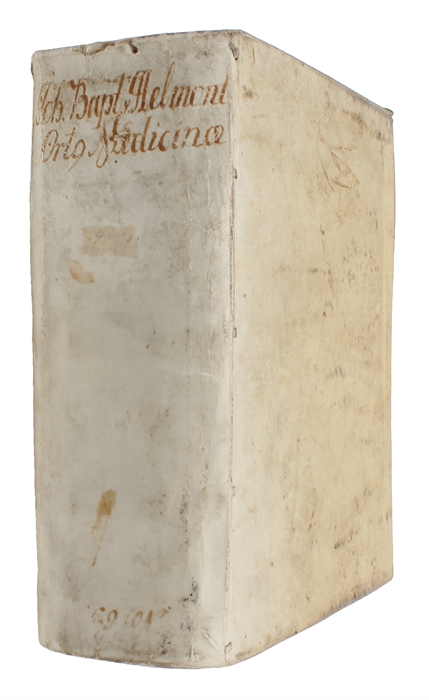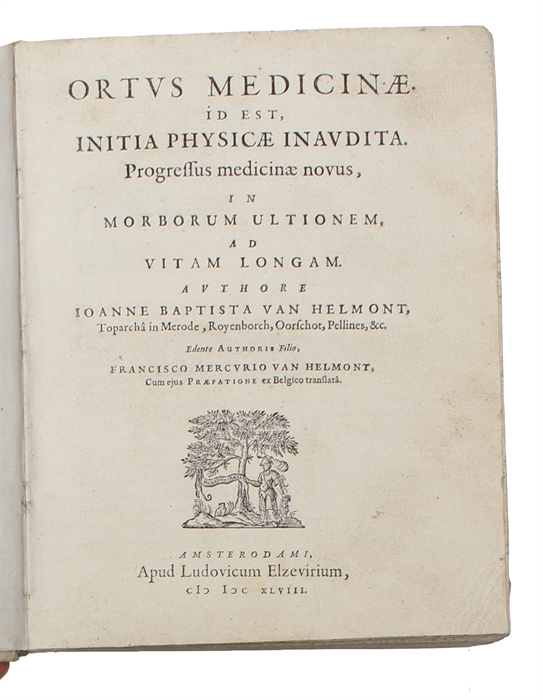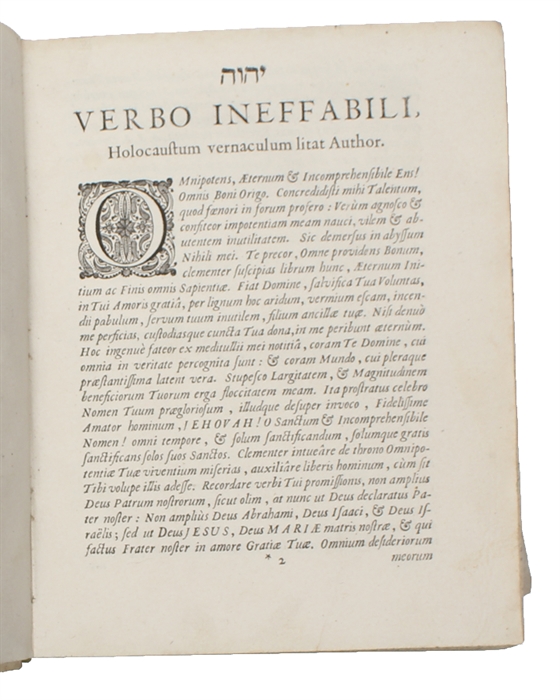"THE FIRST TO USE THE TERM 'GAS'" - PMM 135
HELMONT, JOHAN BAPTIST VON.
Ortus medicinae. Id est, initia physicae inaudita. Progressus medicinae novus, in morborum ultionem, ad vitam longam (+) Opuscula medica inaudita. Editio secunda (+) Febrium Doctrina Inaudita. Editio Secunda (+) Tumulus Pestis. Editio altera.
Amsterdam, Elzevir, 1648.
4to. In contemporary full vellum over wooden boards with title in contemporary hand to spine. Extremities with wear and soiling, boards spotted and corners bumped. Vellum loosened from edges of boards. Internally with a few occassional marginal annotations in contemporary hand and last blank leaf annotated, but generally internally very fine and clean.
[Ortus medicinae:] (32), 88, 87-158, 161-176, 175-382, 373-452, 457-800 pp. + portrait.; [Opuscula medica inaudita:] (8), 110, (2) pp.; [Febrium Doctrina Inaudita:] 115, (1) pp.; [Tumulus Pestis:] 88 pp.
First edition of Helmont’s landmark work, in which he discovered gas. His experiment on a willow tree has been considered among the earliest quantitative studies on plant nutrition and growth and constitutes a milestone in the history of biology. "Helmont was one of the founders of gases, and indeed invented the word ‘gas'. He introduced the gravimetric idea in the analysis of urine.” (Garrison & Morton). “In Medicine, he introduced the examination of the specific gravity of urine for diagnostic purposes. He investigated the fluids in the human body and advanced the study of digestion and other physiological changes by discovering acid digestion in the stomach, coming close to identifying gastric acid with hydrochloric acid some two hundred years before the actual discovery of this fact. He also appreciated the significance of bile in the gut digestion. Edited by his son and published posthumously, the present work established his name as one of the founders of biochemistry: “His discovery of digestive juices in the stomach and intestine, and especially his first use of the specific gravity of urine for diagnostic purposes, mark him as a man of no insignificant importance in the history of medicine”. (Heirs of Hippocrates) Johann Baptist von Helmont (1577-1644) was a Flemish chemist, physiologist, and physician known for his pioneering work in early chemistry and medicine. He is often considered one of the founders of modern chemistry and was a significant figure in the transition from alchemy to chemistry: "Helmont devoted his life to exploring the first principles of nature through chemistry. He is best remembered as the discoverer of gas, a term he coined to describe the 'specific smokes' that remain after the combustion of solids and fluids; among the gases he identified were carbon dioxide, carbon monoxide, chlorine gas and sulphur dioxide. Though separately paginated, 'Opuscula medica inaudita' is considered a part of the whole volume. Originally published as a separate work in 1644, 'Opuscula medica inaudita' contains reprints of Helmont's treatises on the stone, on fevers, on the errors of humoral pathology, and on the plague" (Norman 1048). PMM 135
Helmont’s significance in the development of chemistry is perhaps even greater; he was the first to use the term ‘gas’. He realized that ‘gas’ was distinct from air and water vapour, and he distinguished the ‘gases’ derived from various sources, including that which we call carbon dioxide.” (PMM 135).
He denied that metals dissolved in acid were either destroyed or transmuted, stating that such metals were recoverable in their original quantities, and correctly identifying the process of precipitation. Like Paracelsus, he rejected traditional humoral pathology and advocated an ontological concept of disease, regarding each disease as a specific entity caused by a specific pathogenic agent. He demonstrated that acid is the agent in animal digestion and came near to identifying it as hydrochloric acid; he also identified the causes of asthma and correctly described fever as a part of the body's natural healing process.” (Norman 1048)
'Ortus Medicinae' was translated into English by Christopher Packe in 1662.
Heirs of Hippocrates 254
Osler 2929
Norman 1048
Garrison & Morton 665
Wellcome III, p. 241
Order-nr.: 60796



